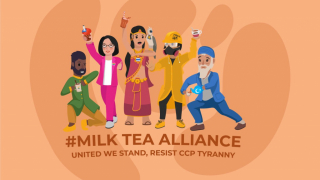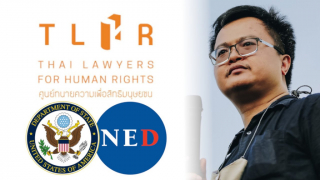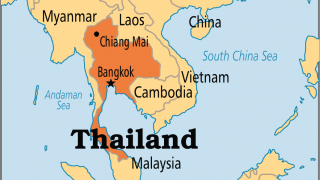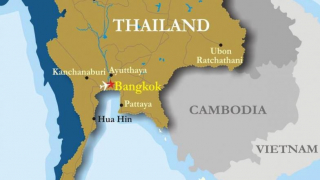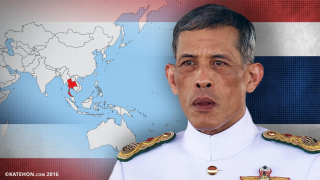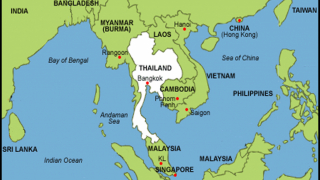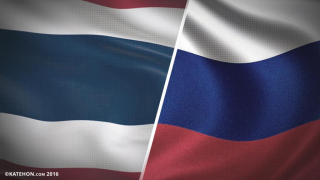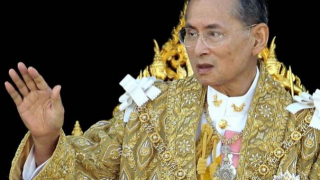Reflected on how Thailand has changed in 7 years with the coup
The children who are about to start their first grade this year have been growing up with Prayut Chan-o-cha, the Prime Minister of Thailand, for their whole life. He staged a coup on 22 May 2014 in the name of the National Council for Peace and Order (NCPO).
From the thick fog covered with conflicts and the big transition in modern Thai society, seven years with the coup is long enough to make us see a clearer picture. If the 2014 coup is a new pin of the conversion of Thai society and economy, what has it changed?
1. Government
“What we obviously see from the past seven years are the attempt to turn the state into an oligarchy by having only the big companies control the country and feeding the people with lies.”
What we can see from the past seven years is the attempt to turn the state into an oligarchy, having only the big companies control the country, and feeding the people with lies. Turning the state into an oligarchy is an effort to change the country into an autocratic governed by one person with absolute power. Therefore, they can control the economy serving the needs of the big company. That is to say, Thailand is so close to becoming modern liberalism since it will be beneficial for the government as they have a conflict of interest.
The more attempts to complete the authority in one area, the more division is increased. Moreover, it will grow the frustration between each group to be under this power. If we compare this government with other democratic, we will find the difference in the management process. Since being an oligarchy state, you can trust no one because they only support their own fellows. No matter what happens, this government will only serve their associates by sending them to be a leader of the herd. Do not let an illusion fool you because being an oligarchy state is nothing but increasing the divisions and conflicts. Let's say if Thailand continues this condition for a bit longer, we will find that many government officials are going to lose their jobs.
Again, this oligarchy system is formed when the bureaucracy is about to fall apart, not to mention the blindness of the NCPO to not see the fact that it had fallen apart a long time ago. The government hopes it may maintain its power. However, as seven years have passed, it has been revealed that the bureaucracy is useless and can not help support the government. For example, the case of the conflict between the Prime Minister's gang and the Ministry of Public Health’s gang. I think all the problems are becoming noticeable. Moreover, it is time to change the whole system. However, it is all a failure, and the power will not last long.
Governing the state by an oligarchy system will expand the dispute in society. Furthermore, this dispute happens not only to the people vs the government but also to the government officials vs other big-name people. I hope that after this third wave of COVID has come to an end, people will run out of their patience due to the government's incompetence. In particular, a new version of Thailand will cause a big disaster to society.
A seven-year-old coup has led Thailand to a fragmented society or the lack of any developed connections between any set of people. Moreover, people will be more polarised all over the territory. Every aspect of society will collapse and be more polarised than we have ever imagined before. There are conflicts in our society that can divide into four aspects; the generation aspect, social class aspect, domestic aspect, and religious aspect. Firstly, the generation aspect, there is a noticeable dispute between people with different generations that we can see clearly. Secondly, the social class aspect, if we talk about the typical conflicts, we will find that it only occurs among middle-class people. Next, the domestic aspect that alters tremendously, we become a single-family and have more divorce. Furthermore, the other relations far beyond family are also divided. Lastly, the religious aspect has split up into groups. All things considered, division happens in every aspect of Thai society.
As mentioned before about problems that the Thai people have to endure, it will cause the government two difficulties, including increased violence and the potential of social reform. To clarify, I am thinking of the big street demonstrations that its impact can compare equally to the day of the great tragedy, October 14, 1973, or even more.
Obviously, this coup has divided society and amplified the pain of the Thai people. The result of the coup seven years ago seems to have persisted and pushed Thailand over the edge without the government being concerned.
In fact, this disaster is a dead-end story, although we still have the Civil Society.
Is it possible to reunite the Civil Society, which means that we all have to leave all the past behind and start fresh? Is it possible for people of all ages to gather up and have conversations about whether we will overcome this crisis?
The civil society has to reunite, call for the next election, and change the constitution. Until this moment, there is only one fact to acknowledge, which is we still do not know how we can mend this crack in our society.
2.Economy
“Since the coup in 2014, the regime of prime minister Prayut Chan-ocha has been giving access to its associates to chair many important roles and control the country's economic system.”
The coup in 2014 is not a new pin in Thailand's economic system. There is nothing neither created nor improved as the country's mission is still focusing more on structural problems. There were two big structural problems in Thailand before the coup started; the middle-income trap, after the Hamburger crisis in 2007, Thailand lost its competitiveness and became an aging society, and the prolonged inequality gap.
These two problems have been ignored since the time the coup had started until nowadays. If someone asks what has improved, we may hear the answers such as “Thailand 4.0”, “the EEC”, and “the New S-curve” which aim to resolve the middle-income trap. However, nothing is substantial even though there is a policy formulation but nothing more than that. The government can make an excuse for the COVID virus that slowed the process, but to be honest, nothing was improved before the pandemic occurred.
Talking about the inequality gap is even harder considering the government’s efficacy. Not to mention a big-name company like CP that had taken over the Tesco Lotus company due to its benefit of being a government supporter. None of these is showing how the government has taken the economic problems seriously. We can not frankly say whether the inequality gap in Thailand has increased since the 2014 coup or not, but what we can assure is that it did not decrease at all.
If the government policy is to work with the big capitalists and support SMEs, the policies have to be more concrete. Time passed with no solid result found.
Apart from the useless improved structural problems policies, other economic policies are temporary as well. For example, “Shopping for The Nation”, and "Encouraging Travelling in Secondary Cities." These policies claim to stimulate the economy, yet it only helps the upper-middle-class people. Any actions from the government are all in vain. They should have done something more sustainably.
Prime Minister Prayut Chan-ocha is a powerful government and almost has absolute power, especially in the first five years before the election. The government has no right to say that all the delays in the economic improvement policy were due to the unstable political situation. The reason behind the failed management is the government depending too much on the bureaucracy. In the political science field, we call it “The Returning of Bureaucratic Polity." The system and the process of this government are both based on the bureaucratic system. For example, the management system in the center for the outbreak of Coronavirus management 2019 has many small units before reaching the senior staff. This system is not the typical organization strategy to use when managing an emergency situation.
The bureaucracy system is outdated in regulations, processes, and the staffs’ mindset. It is a big obstacle that happens in every government. For instance, Mr. Thaksin Shinawatra (the former Prime Minister of Thailand), in his time he could overcome this system even though others said that he did it for his own sake. However, Mr. Thaksin is more successful than our recent Prime Minister, Prayut Chan-Ocha, who has an absolute mindset combined with an old mechanism to drive the policies which are not tangible at all.
The other things are brainstorming and team participation. The government's system relies on its associates, which are the soldiers. It excludes other people making us see soldiers in many important positions working with the government controlling the economic system. Therefore, there is no change in many sections of the country.
Look at the long-term picture, we have lost over seven years of our potential opportunities without any improvement in the economic system. According to a recent study from Worldbank, Thailand's advantage over neighboring countries as a foreign investment option has decreased including, the advantages in infrastructure, market cap, the quality of port infrastructure, and so on, but most importantly is political stability. Thailand has had the advantages over other countries in ASEAN by being a democratic country, but if we look at the country right now, we will find that our country is not improving at all.
Political conflicts from 2006 until 2014 caused us to lose loads of opportunities. Of course, before that, the country was still hard to improve, and now we have this 2017 constitution combined with the national reform plans and the 20-year national strategy. Thus, economic improvement is hard to see. With democracy restricted under the constitution with the 250 senators dominating politics, we are likely to have the same Prime Minister. Additionally, the national reform plans and the 20-year national strategy seem to bias the government staff who can do nothing wrong, unlike the oppositions who could be fired from their position all the time.
The most frightening thing in this government is the locking of improvement.
3. Law - Justice System
“The 2014 coup occurred to violate the reformations, control people, mute their voice and close their mouth with the morals blanketed with the law.”
The three distinct reformations after the coup are a massive depriving of human rights by the law to restrict the people's freedom of speech, restricting people's freedom under strict morals, and being the age of low reliability for justice.
However, these things had happened a long time ago and have been wrong since the beginning. Our society has problematic law and judicial administration, but all the problems have hidden under the rack.
Talking about the law restricting freedom or using law arbitrarily, people might say that it happens because they interpret the law wrongly. After all, what we need to pay attention to is why it happened over and over again? Why those people who use it did not have any consequences. We live in a society where someone can use the law in the wrong way and does not feel guilty at all.
Looking back to the coup, we are talking about wiping out democracy, and the wiper doesn’t have to pay anything. Moreover, the protectors were framed to be bad guys themselves. Our law system is upside down.
Enforcing the law peculiarly always happens for government stability sake which was rooted in Thai society ages ago. Government stability seems to be a modern word, in fact, its meaning has been combined with the culture for a long time, such as the phrase “security is close to calmness.” It is one of the law and justice values that has been emphasized before modern times. For example, the lèse-majesté or a crime against the king, which is an intense penalty reflecting the society's value.
Furthermore, the ideology law before modern time is not justice but normalcy; the state of being usual, typical, or expected. Any opposition against the state or questioning the rulers was seen as a destruction of the social order and nature. Thus, people in Thai society are afraid of being different, and the difference means alienation.
When the modern time has come, the value that still exists in society is the remaining peaceful value, which is the word calmness in the past. For example, Criminal Law R.S. 127 is a criminal law in a modern way. In the Criminal code, we found evidence that the crime against the king is the most important part of all. Moreover, it is the first group started in the model of organized crimes. Talking about morality, in western countries, they separate law apart from religions, unlike in Thailand. There is no clear cut about this topic in Thailand because we have been ruled by paternalism.
The state has a monopoly over people and decides what a good citizen is. Therefore, the value in morality is used as a destroyer of creativity, thought, culture, taste, and art in humans without boundaries in the name of law due to the fact that the rulers do not let people make mistakes. Of course, everything has to have its boundary that is clear enough to see and stable. Otherwise, people will be scared of it, even afraid to think. A modern society's law nowadays is deceived under the social norm that is even more powerful.
All in all, we have to ask in the first place what values that the Thai coup holds in cultural, political, and legal aspects? in order to fully understand what value the coup meant to serve was. Moreover, we have to understand what value the legal system that is part of that regime holds?
It’s obvious that the 2014 coup occurred to violate the reformations, control people, mute their voice, and close their mouths with the morals blanketed with the law. It is an action to cease the reformation.
The topic of Thai Criminal Code section 112 is an overstated problem. It has been used before the NCPO’s time and has been raised to society by the iLaw group even though it was a brush-off. Of course, it is too late for iLaw to fix anything now, the problem is far beyond someone’s hands. Moreover, in this case, it reveals how the Thai judicial administration functions peculiarly.
How can you fight in court if you are incapable of proving the truth because there is no truth for this country to prove? You are at risk of being found guilty because the justice system has already shut your mouth. Not to mention any threats from the government officials. This is witch-hunting, it is not a process of judgment at all.
After the 2014 coup, launched Thai Cyber Law, a new form of Thai Criminal Code section 112 and 116 (charged with treason). At the present time, the Thai Criminal Code section 112 comes back again in its old form. We all know how powerful it is, and also it can happen to anyone.
A new Thai Cyber Law is the result of open space such as social media. It occurred because we can share our thoughts which is something that the government always wanted to control. They try to cease the reformation, but they do not know that it can not be stopped.
Furthermore, there is impunity in Thai society. As stated earlier about the upside-down of the legal system in Thailand where it fails to bring perpetrators of human rights violations to justice. Moreover, innocent people are framed to be guilty and take the penalty they did not do.
The coup itself is also one of the privileges in Thai society that attach closely with the shameless important institution. This institution is where all the special benefits are available only for them, before spreading this thought to other particular groups. The impunity not only protects perpetrators but also suppresses the people who question the social structure. In detail, the judicial institute also has conflicts of interest in this privilege and hides their special benefit under the word “justice." It is a big lie hiding behind the courtroom, bar, and all the papers. When justice does not include everyone in its equation, and the freedom of the court is a supreme power above others, not the intervention like someone else said. Moreover, the legal system is not functioning as it should be, everyone has their own right to raise their questions and challenge the system.
As has been noted, our society should encourage people to have their guts to speak up and share their opinions. However, speaking might not overthrow the state or the reigning monarch. On the other hand, shutting all people’s mouths, prohibiting telling the truth, and enforcing the law as one wishes is something that can beat the throne. Actually, they should listen to other people’s voices and adapt themselves. Therefore, they can exist longer in this modern world.
Of course, all the past seven years, we lost our opportunities due to the government policy, which is to buy time. We have lost every potential that we could have. We could discuss and improve our country in many areas from decentralization, fresh air, clean water, waste management, and so on. However, we can not make any moves, and we are at the same spot where the ruler lacks competence and does not listen to anyone but their own packs. Moreover, we still have the same policymakers who seem to live there for ages, they are outdated people, and their work increases the society's burden.
To put it another way, this is a big exposure to all the problems that have been hidden. It is our chance to fix those problems, and it might be hard to do all the cleaning in the abandoned house. However, it is a lesson to learn. Maybe we can not fix all the mess, but at least other people in our society will acknowledge the problems.
Talking about my dream future, one of them is to have an effective legal system where everyone can live with no harm. Another one is a judicial administration that will support every person equally. Hopefully, our voices will be heard, and everyone will live under the same rules, having no discrimination, and having a trustworthy lawyer.
Let me repeat again, the culture, philosophy of law, and justice can not grow up in a society that easily. It is difficult, but that does not mean impossible. We will have chances to exchange, bargain, alter, and impel society, as long as we stick together. However, there is the lowest bar that everyone can not violate; it is the bar that will allow everyone to live peacefully together without violence in the name of the law. The legal system is supposed to be better than prohibiting people from telling the truth and adding more fuel to society. It is a long-term value in a society that will give us a better life. You can cut the flowers, but you can not prevent the spring.
If the power balance is still the same, which means the parliamentary side has less bargaining power than the government due to the constitutional mechanism. Moreover, if the structure between political institutions still has not changed a bit, and people are hardly in the equation of power. Thus, it is difficult to change because those who have authority will not listen to the people. Even if they heard, they did not really understand what the problem was. With this in mind, the reason is that we leave these privileged people in a vacuum for so long that they can not accept the truth about the moving world. They only want to keep their world, so that they cannot understand how much society has changed.
The last question is the state value and stability is whose security? Are there people in this equation? If it is not, we are nothing for the country. Then we have to ask what all of this is for? However, if our first priority is stability, improving the state and law is a must in order to serve people, so that they can live safely, stable, and sustainably.
4. International Affairs
“When the government does not insist on the national interest firmly enough, it raises questions about whether the international affairs policies have changed from keeping sovereignty and dignity of the country into building righteousness and remaining the Thai military system to survive?”
The result of the coup has slightly changed international affairs policies.
Before the coup, we called Thai foreign policy a “bamboo bending with the wind.” which reflects the foreign policymaker’s mindset that he/she only concerns what is best for the national interest.
As stated about the historical pinpoint, the national interest means the safeness of the nation or society. As we can see from the colonial period, the Cold War until this globalization world, Thailand has tried to have a good relationship with other countries in order to keep its independence and correlation to support the national interest. Therefore, the all-time foreign policy is to choose and adapt based on flexibility to meet the need of national interest effectively.
On the contrary, after the coup has changed, especially the definition of national interest. People start to question the policy of the coup if it is for the national interest or someone else's interest.
In fact, the national interest has many meanings including the country’s independence, sovereignty and dignity of the country, peace, and well-being of its citizens. All of them seem to be the national interest that the government should concern instead of taking advantage of for their own sake.
The foreign policy was questioned if it has already lost the flexibility in order to remain in the national interest and not based on its original purpose. The foreign policy becomes a fake solution policy that lacks strategy and vision.
If you ask someone what is the factor that makes our foreign policy lose its flexibility. The answer is internal politics which is unstable. Furthermore, as our Prime Minister is also incompetent, it affects both the stability and continuity of the foreign policy.
When the policy about the national interest is not firm enough, there is an interesting question asked whether the foreign policy has changed from keeping sovereignty and dignity of the country into building righteousness and remaining the Thai military system to survive?
In the geopolitics aspect, people said that Thailand is about to rely more on China due to it being the first country to endorse the Thai coup. On the other hand, the US. had boycotted and condemned Thai politics and human rights violations all the first four years of the coup.
As for our Prime Minister, he seems to be under the influence of the Chinese government. If one of the national interests is the nation's dignity, the behavior of our Pm is obviously the loss of the nation's dignity. For example, general Tanasak Patimapragorn flattered the Ministry of Foreign Affairs of the People's Republic of China at the ASEAN Summit. He said if the ministry were a woman, he would be falling in love with him. This suspicious act made all the ASEAN member countries worried about Thailand who was once a leading country to negotiate with China, but now acting like a tamed dog under China's control.
In the military aspect, Thailand bought weapons from China, including submarines, tanks, and initiated weapon repair and maintenance centers at Nakhon Ratchasima and Khon Kaen. It might build the variety in the national weapons aspect. However, it makes people start to question whether this trade contrasts or not with the Thai army principle that had been based on the US’s since the Cold War period.
Moving on to the geography aspect, relying on and exploiting China in the economy is not a new phenomenon and not wrong, yet Thailand had started to rely more on China after the coup. The government facilitated and encouraged Chineses entrepreneurs to invest more in Thailand through many campaigns such as the Belt and Road Initiatives and the EEC.
The question is how much power does Thailand have to negotiate with China equally? The potential of Thailand to bargain with China has decreased since the coup. To clarify, in 2017 our PM was not invited to the BRI Summit, showing that China's government is powerful enough to force our government to pass the Bangkok–Nong Khai high-speed railway project.
Thailand has not had much power in the negotiation because of the size of our state. Moreover, having an incompetent foreign policy is much worse for the national interest. Therefore, we can not handle all the pressure from powerful countries like China well enough.
All of them make Thailand lose its opportunity to be the leader in international affairs, especially a bad image we had since the coup. Many countries all over the region lost their trust in Thailand.
They think Thailand cannot put itself in a neutral position in the name of the leading nation in ASEAN due to the bias that we have with China’s government because Thailand has been relying on China, both politically and economically.
If we look from another point of view as allied with the US military, there is a renewed connection between Thailand and the US. after the election. However, we might have been decreasing the importance of the Indo-Pacific strategy of the US project or other benefits that we might gain from the US due to our China favoritism.
In the economic aspect, the political situation in Thailand after the coup had decreased the diversity of our allies, especially the US and the EU. Moreover, because of being a nondemocratic country and having human rights violations, we lost many opportunities to improve our economic system.
The image of Thailand as a country glorifying democracy is being diminished, unlike in 1990. Nowadays, Thailand can neither be the leader in the political aspect nor the ideology aspect.


